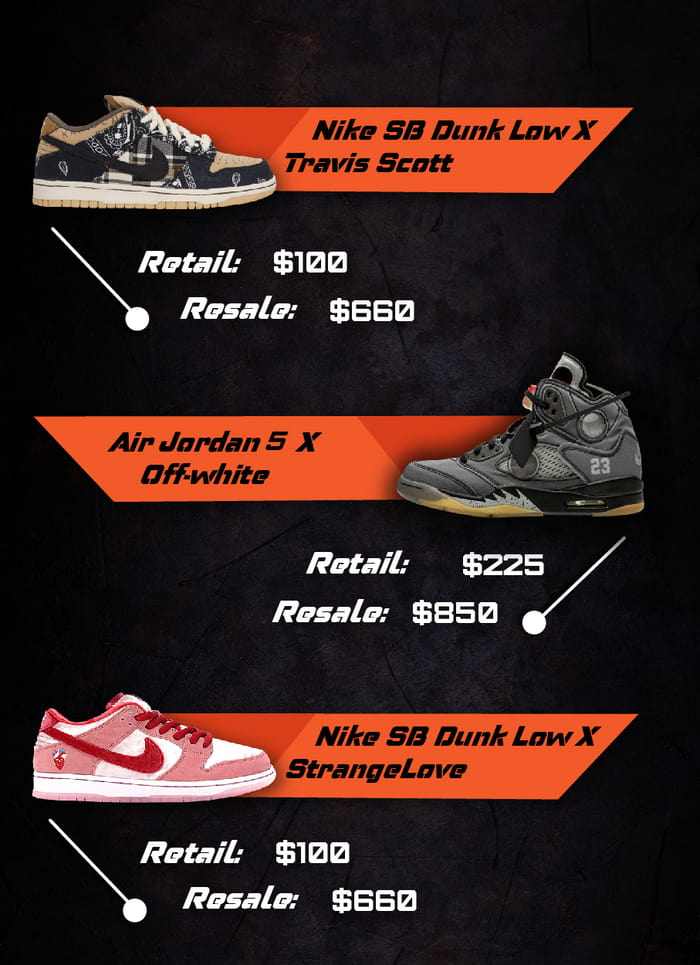

Now let’s talk about how these high prices are affecting the sneaker community as a whole. Resellers aren’t helping out specific people who they think deserve the shoes, it’s all about the highest bidder and so the only thing resellers are contributing to the sneaker community are higher prices. Another local reseller Kevin Chen argues that “Resellers are kind of like the middleman that can help people get shoes that they otherwise wouldn’t be able to get their hands on” but if you strip away all the resellers and their thousand-dollar sneaker bots, the same number of people (or more) would still be able to get those shoes. Almost all shoes that are targeted by the artificial hype retailers and manufacturers create are those linked to black culture, and so members of the predominantly black sneaker culture have to pay more just to feel connected to their culture. Even shoes such as the Chuck Taylor All Star, which was the most popular basketball shoe throughout the 60’s and 70’s and was named after white basketball star Chuck Taylor, are extremely cheap. Any colorway of Nike Dunks, which is the most popular skate shoe ever released, are always selling for at least 1.5x what their retail price is.” But the Nike SB Dunk which was originally a basketball shoe and was adopted by a primarily black sneaker culture even after it was marketed as a skate shoe almost 10 years after its release.

Local reseller Ekam Ghotra commented “I would say they (skate shoes) have (raised in price).

Skating shoes such as Vans or even Nike SB Blazers have much more reasonable pricing and are almost never resold. This also means that less people are able to acquire the shoes and the elitism seen in much of modern fashion crept its way into modern sneaker culture.Ĭompare this with the predominantly white skater culture that emerged in the 80’s and 90’s and the contrast is clear. Because these shoes and everything they represent mean so much to people they are often willing to spend more money than they can reasonably afford to, and resellers are the ones profiting off the culture they created. This allowed for resellers to sell the shoes for hundreds of dollars above retail price because these shoes were so important to the thriving sneaker culture that had developed in primarily black rural areas. Limited releases became the new norm, so that artificial hype would be placed around the shoe so that companies could make more money on the release of their next shoe, or even the re-release of their original shoe. This was quickly taken advantage of by resellers and manufacturers. To many consumers Jordans were more than just a regular basketball shoe, they had meaning behind them and represented Michael Jordan and black culture.

This led to sneaker culture being linked to black youth culture, particularly in urban areas. The ads often even featured famed director Spike Lee. Nike’s advertising campaign focused on linking the shoe both to the black idol Michael Jordan and to black youth culture. So how are these resellers able to make so much profit, and why are people willing to pay up to thousands of dollars for a shoe that was released at a couple hundred? It all started with the release of the Air Jordans in 1985, which have become a staple of sneaker culture. At first glance, it seems like an easy way to make some quick cash but after a deeper look it’s easy to see the exploitative nature of the industry and how it’s ruining sneaker culture as a whole. The secondary sneaker market has grown from roughly $240 in 2014 to an estimated $6+ billion, and many people are picking up the practice as a way to earn a little extra money on the side. Resellers buy hyped-up shoes online for retail price on release day using sneaker bots, then resell them at a higher market-value price. Over the last few years sneaker reselling has made its way into the public’s eye and become synonymous with modern sneaker culture.


 0 kommentar(er)
0 kommentar(er)
